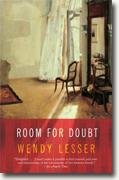Room for Doubt
Wendy Lesser
book reviews:
· general fiction
· chick lit/romance
· sci-fi/fantasy
· graphic novels
· nonfiction
· audio books
· author interviews
· children's books @
curledupkids.com
· DVD reviews @
curledupdvd.com
newsletter
win books
buy online
links
home
for authors
& publishers
for reviewers

 |
Room for Doubt Wendy Lesser Vintage Paperback 224 pages April 2008 |
|
It would be easy to write a spoiler review of this trio of thematically linked personal essays, because at one point Lesser allows the reader to experience an epiphany: Suddenly the overarching purpose of her anecdotes and reflections becomes crystal clear. To avoid ruining the reader's experience of these wonderful exploratory narratives, I've chosen to focus on the first essay, “Out of Berlin.”
This lack of room for doubt in her thinking was an integral part of her personality until certain events in her mid-life challenged her and changed her. One of these seminal experiences was a stay in Germany, a place that as a Jew she'd been conditioned to believe because of the Holocaust was a morally reprehensible destination for any traveler. Yet in 2003 Lesser won a fellowship and took the opportunity to spend a year at the American Academy in Berlin. While there, she experienced German culture in a limited way because her German-language knowledge was inadequate. Without being able to understand the language, she could not truly interpret what she saw and heard, so every conclusion she drew became suspect—subject to doubt. She’d heard Berlin described as a “proletarian town” and studied its character, often asking her English-speaking German friends about her impressions. She found that with no hereditary aristocracy and only a very small population of successful businesspeople, Berliners were less status-conscious than people in other major international cities, a quality of character that she appreciated. She also discovered a quality of “intelligent innocence” or “case hardened optimism” that acknowledges—even accepts—the existence of contraries. “The built-in German sense of bleakness... is able to coexist with a quite inspiring sense of optimistic inventiveness. The possibility that things are terrible does not obliterate the hope that they might also be great.”Perhaps it’s a result of my own German ancestry, but this quality that Lesser apprehended in Berlin of 2003, I also feel about some segments of contemporary American society and view it as a positive attribute. Lesser also beautifully describes several of the art and music events she attended, which ironically made her aware of her personal shortcomings: “I am not used to thinking that there are things beyond my powers,” she confesses. “But Berlin made me aware of my shortcomings: not only about my inability to speak German, but also my ignorance about music, my insufficient grasp of history, my careless approach to scholarship, my amateurish way of looking at paintings . . .”. That despite her non-erudite approach to the arts, Lesser gained important insights from these experiences speaks to the ability of art to transcend national boundaries. One epiphany for Lesser was about how Berlin facilitated her ability to experience an emotion new to her: regret. “There are always dissatisfactions and longings that arise with middle age, feelings about roads not taken and opportunities missed,” she writes. By experiencing regret, Lesser had to learn to doubt the decisions she’d made, indulge herself in thinking the “what ifs” that can lead to melancholy but also a sea change. Rather than dramatic change, however, “Berlin was both the spur and the antidote to these feelings in me,” she reveals. “It made me want to become something other than what I had been before, but it also made me recognize the futility of that desire, and in the end it made me able to live peaceably, if not happily, with that futility.” Certainly, it is impossible to change the past, except in our perceptions of them, yet I can’t help but wonder if Lesser is shorting herself by thinking that she is too old to change some aspects of her life. Perhaps that is a decision that she will revise in time. Originally published on Curled Up With A Good Book at www.curledup.com. © Jeanne Lesinski, 2009 |
|
|
|
 Click here to learn more about this month's sponsor! |
|
| fiction · sf/f · comic books · nonfiction · audio newsletter · free book contest · buy books online review index · links · · authors & publishers reviewers |
|
| site by ELBO Computing Resources, Inc. | |
 What does the phrase "room for doubt" really mean? When a person leaves room for doubt, s/he avoids categorical thinking - that is, the black-or-white mindset that leads to a person rigidly holding a certain viewpoint about a given topic, along with an unwillingness to consider more nuanced thinking on that topic. In describing her upbringing as a West Coast American Jew during the 1950s and ‘60s, Lesser acknowledges that she rarely expressed doubts concerning her beliefs or decisions. She describes her longtime “love of order,... brusque aggressiveness... linear mode of thought,... insistence on constantly distinguishing better from worse”—all qualities of firm conviction to the detriment of nuance.
What does the phrase "room for doubt" really mean? When a person leaves room for doubt, s/he avoids categorical thinking - that is, the black-or-white mindset that leads to a person rigidly holding a certain viewpoint about a given topic, along with an unwillingness to consider more nuanced thinking on that topic. In describing her upbringing as a West Coast American Jew during the 1950s and ‘60s, Lesser acknowledges that she rarely expressed doubts concerning her beliefs or decisions. She describes her longtime “love of order,... brusque aggressiveness... linear mode of thought,... insistence on constantly distinguishing better from worse”—all qualities of firm conviction to the detriment of nuance.